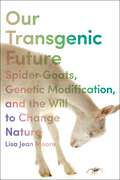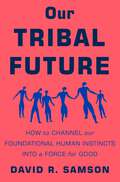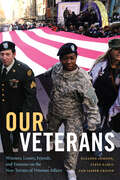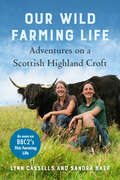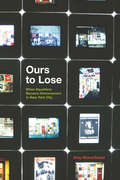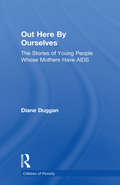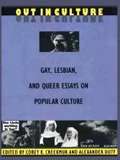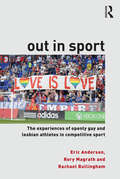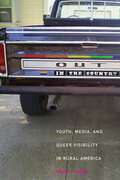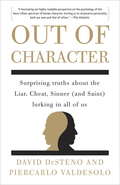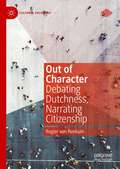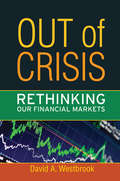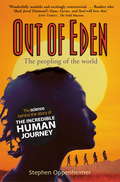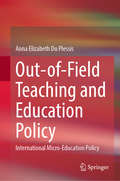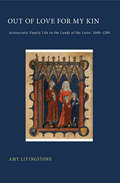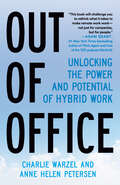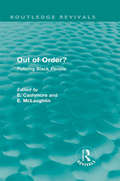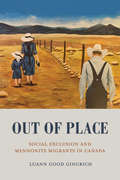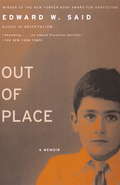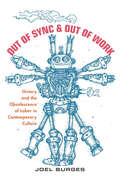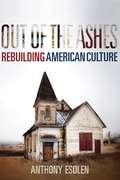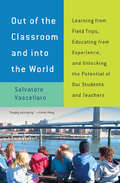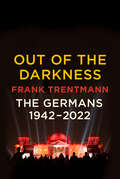- Table View
- List View
Our Transgenic Future: Spider Goats, Genetic Modification, and the Will to Change Nature
by Lisa Jean MooreHow scientific advances in genetic modification will fundamentally change the natural worldThe process of manipulating the genetic material of one animal to include the DNA of another creates a new transgenic organism. Several animals, notably goats, mice, sheep, and cattle are now genetically modified in this way. In Our Transgenic Future, Lisa Jean Moore wonders what such scientific advances portend. Will the natural world become so modified that it ceases to exist? After turning species into hybrids, can we ever get back to the original, or are they forever lost? Does genetic manipulation make better lives possible, and if so, for whom?Moore centers the story on goats that have been engineered by the US military and civilian scientists using the DNA of spiders. The goat’s milk contains a spider-silk protein fiber; it can be spun into ultra-strong fabric that can be used to manufacture lightweight military body armor. Researchers also hope the transgenically produced spider silk will revolutionize medicine with biocompatible medical inserts such as prosthetics and bandages. Based on in-depth research with spiders in Florida and transgenic goats in Utah, Our Transgenic Future focuses on how these spidergoats came into existence, the researchers who maintain them, the funders who have made their lives possible, and how they fit into the larger science of transgenics and synthetics. This book is a fascinating story about the possibilities of science and the likely futures that may come.
Our Tribal Future: How to Channel Our Foundational Human Instincts into a Force for Good
by David R. SamsonAn astounding and inspiring look at the science behind tribalism, and how we can learn to harness it to improve the world around us.What do you think of when you hear the word “tribalism?” For many, it conjures images of bigotry, xenophobia, and sectarian violence. Others may envision their own tribe: family, friends, and the bonds of loyalty that keep them together. Tribalism is one of the most complex and ancient evolutionary forces; it gave us the capacity for cooperation and competition, and allowed us to navigate increasingly complex social landscapes. It is so powerful that it can predict our behavior even better than race, class, gender, or religion. But in our vast modern world, has this blessing become a curse?Our Tribal Future explores a central paradox of our species: how altruism, community, kindness, and genocide are all driven by the same core adaptation. Evolutionary anthropologist David R. Samson engages with cutting-edge science and philosophy, as well as his own field research with small-scale societies and wild chimpanzees, to explain the science, ethics, and history of tribalism in compelling and accessible terms.This bold and brilliant book reveals provocative truths about our nature. Readers will discover that tribalism cannot, and should not, be eliminated entirely—to do so would be to destroy what makes us human. But is it possible to channel the best of this instinct to enrich our lives while containing the worst of its dangers?
Our Veterans: Winners, Losers, Friends, and Enemies on the New Terrain of Veterans Affairs
by Suzanne Gordon Steve Early Jasper CravenIn Our Veterans, Suzanne Gordon, Steve Early, and Jasper Craven explore the physical, emotional, social, economic, and psychological impact of military service and the problems that veterans face when they return to civilian life. The authors critically examine the role of advocacy organizations, philanthropies, corporations, and politicians who purport to be “pro-veteran.” They describe the ongoing debate about the cost, quality, and effectiveness of healthcare provided or outsourced by the Department of Veterans Affairs (VA). They also examine generational divisions and political tensions among veterans, as revealed in the tumultuous events of 2020, from Black Lives Matter protests to the Trump-Biden presidential contest. Frank and revealing, Our Veterans proposes a new agenda for veterans affairs linking service provision to veterans to the quest for broader social programs benefiting all Americans.
Our War on Ourselves
by Willem H. VanderburgOur approach to knowing and doing is based on delegating physical phenomena to physicists, biological phenomena to biologists, social phenomena to sociologists, economic phenomena to economists, and so on. This approach to knowledge and practice works very well when one category of phenomena dominates (as in mechanical and technical systems), but does not work when many categories of phenomena make significant contributions (as in the biological and cultural spheres). As a result, our civilization succeeds in its scientific and technical endeavours yet fails in dealing with communities and ecosystems.Following his groundbreaking Labyrinth of Technology and Living in the Labyrinth of Technology, Willem H. Vanderburg's Our War on Ourselves explores the type of war we have unleashed on our lives by emphasizing discipline-based processes. The work also illuminates how we can achieve a more balanced, livable, and sustainable future by combining technical and cultural perspectives in our educational and institutional settings.
Our Wild Farming Life: Adventures on a Scottish Highland Croft
by Lynn Cassells Sandra BaerAs seen on the BBC’s This Farming Life The inspirational story of Lynbreck Croft—a regenerative Scottish farm rooted in local food, community, and the dreams of two women. "A ripping good account of the guts, luck and perseverance it takes to create a productive and healthy farm or croft that jumps the rails of our conventional industrial agriculture."—Nick Offerman, New York Times bestselling author of Where the Deer and the Antelope Play "I raced through this beautiful story with mounting awe and excitement. . . . Pragmatism, honesty and openness to new and old ideas shines through on every page. I hope it inspires legions of new farmers."—Isabella Tree, author of Wilding Lynn and Sandra left their friends, family, and jobs in England to travel north to Scotland to find a bit of land that they could call their own. They had in mind keeping a few chickens, a kitchen garden, and renting out some camping space; instead, they fell in love with Lynbreck Croft—150 acres of opportunity and beauty, shrouded by the Cairngorms and deep in the Highlands of Scotland. But they had no money, no plan, and no experience in farming. In Our Wild Farming Life, Lynn and Sandra recount their experiences as they rebuild their new home and work out what kind of farmers they want to be. They learn how to work with Highland cattle, become part of the crofting community and begin to truly understand how they can farm in harmony with nature to produce wonderful food for themselves and the people around them. Through efforts like these, Lynn and Sandra have been able to combine regenerative farming practices with old crofting traditions to keep their own personal values intact. Our Wild Farming Life is what happens when you follow your dreams of living on the land; a story of how two people became farmers—and how they learned to make a living from it, their way. "[This] is a warm yet realistic chronicle of the world of the small-time farmer, sharing a vision of how we humans can feed ourselves sustainably and ethically while living in harmony with the natural world."—Booklist "For anyone who has ever sat in a city office dreaming of . . . living off the land, this book will inspire them to take the plunge."—The Telegraph
Ours to Lose: When Squatters Became Homeowners in New York City
by Amy StarecheskiThough New York's Lower East Side today is home to high-end condos and hip restaurants, it was for decades an infamous site of blight, open-air drug dealing, and class conflict--an emblematic example of the tattered state of 1970s and '80s Manhattan. Those decades of strife, however, also gave the Lower East Side something unusual: a radical movement that blended urban homesteading and European-style squatting in a way never before seen in the United States. Ours to Lose tells the oral history of that movement through a close look at a diverse group of Lower East Side squatters who occupied abandoned city-owned buildings in the 1980s, fought to keep them for decades, and eventually began a long, complicated process to turn their illegal occupancy into legal cooperative ownership. Amy Starecheski here not only tells a little-known New York story, she also shows how property shapes our sense of ourselves as social beings and explores the ethics of homeownership and debt in post-recession America.
Out Here By Ourselves: The Stories of Young People Whose Mothers Have AIDS (Children of Poverty)
by Diane DugganFirst published in 2001. Routledge is an imprint of Taylor & Francis, an informa company.
Out in Culture: Gay, Lesbian and Queer Essays on Popular Culture
by Corey K. Creekmur Alexander DotyOut in Culture charts some of the ways in which lesbians, gays, and queers have understood and negotiated the pleasures and affirmations, as well as the disappointments, of mass culture. The essays collected here, combining critical and theoretical works from a cross-section of academics, journalists, and artists, demonstrate a rich variety of gay and lesbian approaches to film, television, popular music, and fashion. This wide-ranging anthology is the first to juxtapose pioneering work in gay and lesbian media criticism with recent essays in contemporary queer cultural studies.Uniquely accessible, Out in Culture presents such popular writers as B. Ruby Rich, Essex Hemphill, and Michael Musto as well as influential critics such as Richard Dyer, Chris Straayer, and Julia Lesage, on topics ranging from the queer careers of Agnes Moorehead and Pee Wee Herman to the cultural politics of gay drag, lesbian style, the visualization of AIDS, and the black snap! queen experience. Of particular interest are two "dossiers," the first linking essays on the queer content of Alfred Hitchcock's films, and the second on the production and reception of popular music within gay and lesbian communities. The volume concludes with an extensive bibliography--the most comprehensive currently available--of sources in gay, lesbian, and queer media criticism.Out in Culture explores the distinctive and original ways in which gays, lesbians, and queers have experienced, appropriated, and resisted the images and artifacts of popular culture. This eclectic anthology will be of interest to a broad audience of general readers and scholars interested in gay and lesbian issues; students of film, media, gender, and cultural studies; and those interested in the emerging field of queer theory.Contributors. Sabrina Barton, Edith Becker, Rhona J. Berenstein, Nayland Blake, Michelle Citron, Danae Clark, Corey K. Creekmur, Alexander Doty, Richard Dyer, Heather Findlay, Jan Zita Grover, Essex Hemphill, John Hepworth, Jeffrey Hilbert, Lucretia Knapp, Bruce La Bruce, Al LaValley, Julia Lesage, Michael Moon, Michael Musto, B. Ruby Rich, Marlon Riggs, Arlene Stein, Chris Straayer, Anthony Thomas, Mark Thompson, Valerie Traub, Thomas Waugh, Patricia White, Robin Wood
Out in Sport: The experiences of openly gay and lesbian athletes in competitive sport
by Eric Anderson Rory Magrath Rachael BullinghamResearch has shown that since the turn of the millennia, matters have rapidly improved for gays and lesbians in sport. Where gay and lesbian athletes were merely tolerated a decade ago, today they are celebrated. This book represents the most comprehensive examination of the experiences of gays and lesbians in sport ever produced. Drawing on interviews with openly gay and lesbian athletes in the US and the UK, as well as media accounts, the book examines the experiences of ‘out’ men and women, at recreational, high school, university and professional levels, in addition to those competing in gay sports leagues. Offering a new approach to understanding this important topic, Out in Sport is essential reading for students and scholars of sport studies, LGBT studies and sociology, as well as sports practitioners and trainers.
Out in the Country: Youth, Media, and Queer Visibility in Rural America (Intersections #2)
by Mary L. GrayWinner of the 2009 Ruth Benedict Prize for Outstanding Monograph from the Society of Lesbian and Gay AnthropologistsWinner of the 2010 Distinguished Book Award from the American Sociological Association, Sociology of Sexualities SectionWinner of the 2010 Congress Inaugural Qualitative Inquiry Book Award Honorable MentionFrom Wal-Mart drag parties to renegade Homemaker's Clubs, Out in the Country offers an unprecedented contemporary account of the lives of today's rural queer youth. Mary L. Gray maps out the experiences of young people living in small towns across rural Kentucky and along its desolate Appalachian borders, providing a fascinating and often surprising look at the contours of gay life beyond the big city. Gray illustrates that, against a backdrop of an increasingly impoverished and privatized rural America, LGBT youth and their allies visibly--and often vibrantly--work the boundaries of the public spaces available to them, whether in their high schools, public libraries, town hall meetings, churches, or through websites. This important book shows that, in addition to the spaces of Main Street, rural LGBT youth explore and carve out online spaces to fashion their emerging queer identities. Their triumphs and travails defy clear distinctions often drawn between online and offline experiences of identity, fundamentally redefining our understanding of the term 'queer visibility' and its political stakes. Gray combines ethnographic insight with incisive cultural critique, engaging with some of the biggest issues facing both queer studies and media scholarship. Out in the Country is a timely and groundbreaking study of sexuality and gender, new media, youth culture, and the meaning of identity and social movements in a digital age.
Out of Character
by Piercarlo Valdesolo David DestenoHave you ever wondered why a trumpeter of family values would suddenly turn around and cheat on his wife? Why jealousy would send an otherwise level-headed person into a violent rage? What could drive a person to blow a family fortune at the blackjack tables? Or have you ever pondered what might make Mr. Right leave his beloved at the altar, why hypocrisy seems to be rampant, or even why, every once in awhile, even you are secretly tempted, to lie, cheat, or steal (or, conversely, help someone you never even met)? This book answers these questions and more, and in doing so, turns the prevailing wisdom about who we are upside down. Our character, argue psychologists DeSteno and Valdesolo, isn't a stable set of traits, but rather a shifting state that is subject to the constant push and pull of hidden mechanisms in our mind. And it's the battle between these dueling psychological forces that determine how we act at any given point in time. Drawing on the surprising results of the clever experiments concocted in their own laboratory, DeSteno and Valdesolo shed new scientific light on so many of the puzzling behaviors that regularly grace the headlines. For example, you'll learn: * Why Tiger Woods just couldn't resist the allure of his mistresses even though he had a picture-perfect family at home. And why no one, including those who knew him best, ever saw it coming. * Why even the shrewdest of investors can be tempted to gamble their fortunes away (and why risky financial behavior is driven by the same mechanisms that compel us to root for the underdog in sports). * Why Eliot Spitzer, who made a career of crusading against prostitution, turned out to be one of the most famous johns of all time. * Why Mel Gibson, a noted philanthropist and devout Catholic, has been repeatedly caught spewing racist rants, even though close friends say he doesn't have a racist bone in his body. * And why any of us is capable of doing the same, whether we believe it or not!A surprising look at the hidden forces driving the saint and sinner lurking in us all, Out of Character reveals why human behavior is so much more unpredictable than we ever realized. From the Hardcover edition.
Out of Character: Debating Dutchness, Narrating Citizenship (Cultural Sociology)
by Rogier van ReekumThis book offers a detailed and innovative study of the Dutch case of politics of citizenship and nationalism by focusing on public and political controversies in the crucial period of 1973–2015. By foregrounding the crucial role of performance and narration in public and political debates, this book shows how discourses of citizenship and nationhood are deeply shaped by established repertoires and long-lasting lines of disagreement about difference and belonging in the Netherlands. While change did occur within the Dutch context during this period, this book reveals that these transformations were not primarily driven by purportedly permissive and accommodating responses to immigration and cultural diversity. Instead, it unveils a Dutch landscape deeply marked by challenges related to race, democracy, and liberal exceptionalism. In doing so, the book contributes to ongoing debates in the study of citizenship, nationalism, and intellectual history around the merits and limitations of liberal politics of inclusion. It critically extends concepts and arguments in cultural pragmatics and problematizes the common hope that public debate may progressively resolve antagonisms over difference. With a focus on empirical research, the book meticulously reconstructs the emergence of national identity debates in recent decades and vividly portrays the dynamics and tensions of these public performances while dissecting their role in shaping the nation's identity and its boundaries. The book covers a crucial period of the European politics of citizenship and nationhood in which anti-immigrant politics, new modes of racism, and the bordering of Europe took shape. It locates the Dutch case within these developments and insists on the importance of historical continuity and narrative performance. This book demonstrates that the Netherlands, and Europe more broadly, has not overcome the profound consequences of its past.
Out of Crisis: Rethinking Our Financial Markets
by David A. WestbrookFormer Federal Reserve chair Greenspan recently said that the risk management paradigm is broken; thus our understanding of financial regulation no longer makes sense. More generally, the current financial crisis obliges us to rethink the relationships among "financial markets" and "governments." In Out of Crisis financial analyst David Westbrook illuminates the intellectual, business, and policy errors that have led us into the present morass. Through a vivid legal and political analysis he shows how the ideologies of the right and left have distorted financial thinking and policy. Learning from these errors, the book sketches the emergence of a new understanding of risk management and bureaucratic regulation. Out of Crisis begins the tasks of rethinking the structures that constitute financial markets and exploring how such structures may be strengthened. Taking responsibility for the markets we build to do so much of our society's work, we may yet become mature capitalists.
Out of Eden: The Peopling Of The World
by Stephen OppenheimerIn a brilliant synthesis of genetic, archaeological, linguistic and climatic data, Oppenheimer challenges current thinking with his claim that there was only one successful migration out of Africa. In 1988 Newsweek headlined the startling discovery that everyone alive on the earth today can trace their maternal DNA back to one woman who lived in Africa 150,000 years ago. It was thought that modern humans populated the world through a series of migratory waves from their African homeland. Now an even more radical view has emerged, that the members of just one group are the ancestors of all non-Africans now alive, and that this group crossed the mouth of the Red Sea a mere 85,000 years ago. It means that not only is every person on the planet descended from one African 'Eve' but every non-African is related to a more recent Eve, from that original migratory group. This is a revolutionary new theory about our origins that is both scholarly and entertaining, a remarkable account of the kinship of all humans.Further details of the findings in this book are presented at www.bradshawfoundation.com/stephenoppenheimer/
Out of Eden: The Peopling Of The World
by Stephen OppenheimerIn a brilliant synthesis of genetic, archaeological, linguistic and climatic data, Oppenheimer challenges current thinking with his claim that there was only one successful migration out of Africa. In 1988 Newsweek headlined the startling discovery that everyone alive on the earth today can trace their maternal DNA back to one woman who lived in Africa 150,000 years ago. It was thought that modern humans populated the world through a series of migratory waves from their African homeland. Now an even more radical view has emerged, that the members of just one group are the ancestors of all non-Africans now alive, and that this group crossed the mouth of the Red Sea a mere 85,000 years ago. It means that not only is every person on the planet descended from one African 'Eve' but every non-African is related to a more recent Eve, from that original migratory group. This is a revolutionary new theory about our origins that is both scholarly and entertaining, a remarkable account of the kinship of all humans.Further details of the findings in this book are presented at www.bradshawfoundation.com/stephenoppenheimer/
Out-of-Field Teaching and Education Policy: International Micro-Education Policy
by Anna Elizabeth Du PlessisThis book focuses on the elusive out-of-field teaching phenomenon and its direct effects on quality education globally. Based on the experiences and concerns of teachers and school leaders, it investigates the phenomenon’s impact on everyday teaching and school practices, and offers insights into the challenges that out-of-field teachers face in maintaining their role as the “knowledgeable counterpart” in their teaching and learning environments. In this frame, it also highlights the often-overlooked importance of initial teacher education and its preparation of prospective teachers for employment in complex school contexts, subjects or year levels. The book emphasises the need to develop specific policy strategies to effectively address the global implications of out-of-field teaching, and explores the potential of micro-education policies as targeted support resources for teachers in these challenging positions. Through this new policy lens, which renegotiates the discourse of education policy as a quality education improvement framework, the book offers readers a comprehensive understanding of the urgent need for policy to uphold all stakeholders involved in these unique and complex environments. Accordingly, the book is a valuable resource for academic advisors, decision-makers, policy-makers, and educational and school leaders in developing new approaches to improving school outcomes that promote the retention of teachers for a strong and stable teaching workforce.
Out of Love for My Kin: Aristocratic Family Life in the Lands of the Loire, 1000–1200
by Amy LivingstoneIn Out of Love for My Kin, Amy Livingstone examines the personal dimensions of the lives of aristocrats in the Loire region of France during the eleventh and twelfth centuries. She argues for a new conceptualization of aristocratic family life based on an ethos of inclusion. Inclusivity is evident in the care that medieval aristocrats showed toward their families by putting in place strategies, practices, and behaviors aimed at providing for a wide range of relatives. Indeed, this care--and in some cases outright affection--for family members is recorded in the documents themselves, as many a nobleman and woman made pious benefactions "out of love for my kin." In a book made rich by evidence from charters--which provide details about life events including birth, death, marriage, and legal disputes over property--Livingstone reveals an aristocratic family dynamic that is quite different from the fictional or prescriptive views offered by literary depictions or ecclesiastical sources, or from later historiography. For example, she finds that there was no single monolithic mode of inheritance that privileged the few and that these families employed a variety of inheritance practices. Similarly, aristocratic women, long imagined to have been excluded from power, exerted a strong influence on family life, as Livingstone makes clear in her gender-conscious analysis of dowries, the age of men and women at marriage, lordship responsibilities of women, and contestations over property. The web of relations that bound aristocratic families in this period of French history, she finds, was a model of family based on affection, inclusion, and support, not domination and exclusion.
Out of Office: The Big Problem and Bigger Promise of Working from Home
by Anne Helen Petersen Charlie WarzelThe future isn&’t about where we will work, but how. For years we have struggled to balance work and life, with most of us feeling overwhelmed and burned out because our relationship to work is broken. This &“isn't just a book about remote work. It's a book that helps us imagine a future where our lives—at the office and home—are happier, more productive, and genuinely meaningful&” (Charles Duhigg, bestselling author of The Power of Habit).Out of Office is a book for every office worker – from employees to managers – currently facing the decision about whether, and how, to return to the office. The past two years have shown us that there may be a new path forward, one that doesn&’t involve hellish daily commutes and the demands of jam-packed work schedules that no longer make sense. But how can we realize that future in a way that benefits workers and companies alike? Based on groundbreaking reporting and interviews with workers and managers around the world, Out of Office illuminates the key values and questions that should be driving this conversation: trust, fairness, flexibility, inclusive workplaces, equity, and work-life balance. Above all, they argue that companies need to listen to their employees – and that this will promote, rather than impede, productivity and profitability. As a society, we have talked for decades about flexible work arrangements; this book makes clear that we are at an inflection point where this is actually possible for many employees and their companies. Out of Office is about so much more than zoom meetings and hybrid schedules: it aims to reshape our entire relationship to the office.
Out of Order?: Policing Black People (Routledge Revivals)
by E. Cashmore E. McLaughlinFirst published in 1991, this book evaluates and compares the problematic relationships that have sometimes existed between police and Afro-Caribbean people in Britain and in the United States of America. Contributors from both sides of the Atlantic assess conflicting claims from police and black communities, as to whether some police are racist or too brutal in their operations. Although this book was written in the early 90s, many of the issues discussed remain interesting and relevant to our society today.
Out of Place: Social Exclusion and Mennonite Migrants in Canada
by Luann Good GingrichThe flow of migrants from south to north and east to west carries with it growing concerns about the economic integration, political incorporation, and social inclusion of newcomers and their children. But what happens when a group of people deliberately excludes themselves from mainstream society? How can social policies, human services, and communities best understand and respond to them? In Out of Place, Luann Good Gingrich explores social inclusion and exclusion in relation to the approximately 60,000 Low German-speaking Mennonites who have migrated from traditionally self-sufficient and agrarian colonies in Latin America to rural areas of Canada. By examining the free-market principles that organize the human services industry the author exposes the inherent conflict that arises when this "market logic" is imposed on a group that does not embrace these ideals. The author's innovative approach to social policy and human services which emphasizes the relationship between dominant and subordinate cultures, encourages us to find new ways to authentically engage with difference and bridge the gaps that divide us.
Out of Place
by Edward W. Said<P>From one of the most important intellectuals of our time comes an extraordinary story of exile and a celebration of an irrecoverable past. <P>A fatal medical diagnosis in 1991 convinced Edward Said that he should leave a record of where he was born and spent his childhood, and so with this memoir he rediscovers the lost Arab world of his early years in Palestine, Lebanon, and Egypt. <P>Said writes with great passion and wit about his family and his friends from his birthplace in Jerusalem, schools in Cairo, and summers in the mountains above Beirut, to boarding school and college in the United States, revealing an unimaginable world of rich, colorful characters and exotic eastern landscapes. <P>Underscoring all is the confusion of identity the young Said experienced as he came to terms with the dissonance of being an American citizen, a Christian and a Palestinian, and, ultimately, an outsider. <P>Richly detailed, moving, often profound, Out of Place depicts a young man's coming of age and the genesis of a great modern thinker.
Out of Sync & Out of Work: History and the Obsolescence of Labor in Contemporary Culture
by Joel BurgesOut of Sync & Out of Work explores the representation of obsolescence, particularly of labor, in film and literature during a historical moment in which automation has intensified in capitalist economies. Joel Burges analyzes texts such as The Invention of Hugo Cabret, Wreck-It Ralph, Fantastic Mr. Fox, and Iron Council, and examines their “means” of production. Those means include a range of subjects and narrative techniques, including the “residual means” of including classic film stills in a text, the “obstinate means” of depicting machine breaking, the “dated means” of employing the largely defunct technique of stop-motion animation, and the “obsolete” means of celebrating a labor strike. In every case, the novels and films that Burges scrutinizes call on these means to activate the reader’s/viewer’s awareness of historical time. Out of Sync & Out of Work advances its readers’ grasp of the complexities of historical time in contemporary culture, moving the study of temporality forward in film and media studies, literary studies, critical theory, and cultural critique.
Out of the Ashes: Rebuilding American Culture
by Anthony M. EsolenWhat do you do when an entire civilization is crumbling around you? You do everything. This is a book about how to get started.Providence College professor Anthony Esolen, blunt and prophetic, makes the case that the decay of Western civilization is alarmingly advanced. Our sickly, sub-pagan state resembles a bombed-out city.We have to assess the damage, but merely lamenting it does no good. There is work to be done.The first step is the restoration of truth. America’s most powerful institutions-including the government-are mass producers of deceit. We have to recognize the lies and clear our minds of cant.Our culture produces only the drab or the garish. We must restore beauty-in art, architecture, music, and worship.There are two things wrong with our schools-everything our children don’t learn in them, and everything they do learn. Public schools are beyond reform; we have to start over.Our universities are as bad as our schools. A few can be saved, but for the most part, we must build new ones. In fact, this is already being done. We have to support these efforts as if our children’s souls depended on it.Repudiating the Sexual Revolution, that prodigious engine of misery, requires more than zipping up. The modern world has made itself ignorant about sex-in particular that there are two of them and they’re profoundly different. We must restore manhood and womanhood.In our servile economy, we raise bureaucrats not craftsmen. We must rediscover how to make things that are beautiful and lasting-the products of human work. And we must dispense with the "rent-seekers”-the proliferating middlemen whose own work contributes nothing.We have turned sports into a job for our children. Instead of playing we "work out.” A genuine civilization is based on celebration. We must restore play to human life, seeing all the other days of the week in light of the Sabbath.The gigantic scale of government has made us a nation of "idiots,” incapable of attending to public affairs and the common good. We must insist that the Constitution is not whatever judges say it is, complying with but not obeying their edicts while we reclaim our freedom of religion one outdoor procession, one public lecture, one parish picnic at a time.We must love this world, but we have here no abiding city. The great division is between those who place all their hope in the present life and those who know that we are pilgrims. There is no retreat, but take courage-we have our map. Let us begin.
Out of the Classroom and into the World
by Salvatore VascellaroBank Street College of Education professor Salvatore Vascellaro is a leading advocate of taking children and teachers into a wider world as the key to improving our struggling schools.Combining practical and theoretical guidance, Out of the Classroom and into the World visits a rich variety of classrooms transformed by innovative field trip curricula--showing how students' hearts and minds are opened as they discover how a suspension bridge works, what connects them to the people and places of their neighborhood, and as they come to understand the ecosystem of a river by following it to its source. Vascellaro shows, equally, that what teachers can offer children is fueled by their own engagement with the world, and he offers stunning examples of teachers awakened by their direct experiences with the social issues plaguing American society--from the flood-torn areas of New Orleans to the mining areas of West Virginia.Based on the core principles of progressive pedagogy, and the wisdom gained from Vascellaro's experience as a teacher, school administrator, and teacher educator, Out of the Classroom and into the World is a direct retort to test scores and standards as adequate measures of teaching and learning--an inspiring call and major new resource for anyone interested in reinvigorating America's classrooms.
Out of the Darkness: The Germans, 1942-2022
by Frank Trentmann#1 Most Important Political Book of 2023, Sueddeutsche Zeitung (Germany)A Best Book of 2023, The Telegraph (Great Britain)A gripping and nuanced history of the German people from World War II to the war in Ukraine, including revealing new primary source material on Germany's transformationIn 1945, Germany lay in ruins, morally and materially. Its citizens stood condemned by history, responsible for a horrifying genocide and war of extermination. But by the end of Angela Merkel&’s tenure as chancellor in 2021, Germany looked like the moral voice of Europe, welcoming more than one million refugees, holding together the tenuous threads of the European Union, and making military restraint the center of its foreign policy. At the same time, Germany's rigid fiscal discipline and energy deals with Vladimir Putin have cast a shadow over the present. Innumerable scholars have asked how Germany could have degenerated from a nation of scientists, poets, and philosophers into one responsible for genocide. This book raises another vital question: How did a nation whose past has been marked by mass murder, a people who cheered Adolf Hitler, reinvent themselves, and how much?Trentmann tells this dramatic story of the German people from the middle of World War II through the Cold War and the division into East and West to the fall of the Berlin Wall and the struggle to find a place in the world today. This journey is marked by a series of extraordinary moral conflicts: admissions of guilt and shame vying with immediate economic concerns; restitution for some but not others; tolerance versus racism; compassion versus complicity. Through a range of voices—German soldiers and German Jews; displaced persons in limbo; East German women and shopkeepers angry about energy shortages; opponents and supporters of nuclear power; volunteers helping migrants and refugees, and right-wing populists attacking them—Trentmann paints a remarkable and surprising portrait spanning eighty years of the conflicted people at the center of Europe, showing how the Germans became who they are today.
